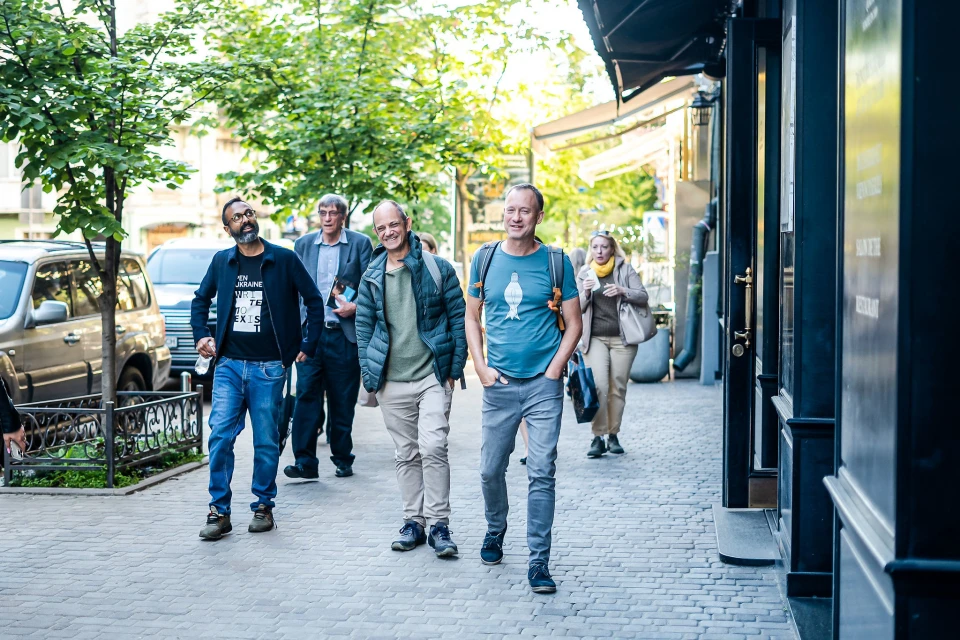PEN Ukraine hosted a delegation of cultural figures from South Africa and India within the framework of the programme In Solidarity With Ukraine, supported by the International Renaissance Foundation
The media partner of the programme is Espresso TV channel.
A delegation of writers and journalists from South Africa and India arrived in Ukraine: writer and police officer Andrew Brown, journalist Peter Fabricius, writer and 2021 Man Booker Prize winner Damon Galgut, and writer and journalist Anjan Sundaram.
“This visit has fundamentally changed my view of the war and the motivation of the Russians,” says Andrew Brown, a lawyer and police reservist. “I now have a much deeper understanding of what is at stake. I hadn’t realised how distinctive Ukraine’s culture has always been, and how Ukrainians are now defending it from aggressive Russian assimilation.”
The guide Yulia Bevzenko introduced the guests to the capital, its history and architecture. After that, the delegation learned about NGOs and cultural institutions operating in Kyiv. In particular, the authors visited the Ptakhy Volunteer Centre and the Holodomor Museum, and met the team of the Voices of Children charity foundation, public figure Tata Kepler, and human rights activist Oleksandra Matviychuk.
The delegation, together with writer Andriy Kurkov, also visited the cities and towns of Kyiv and Chernihiv regions to see the consequences of Russian aggression with their own eyes. Anjan Sundaram, an Indian journalist, shared his emotions about what he saw in the de-occupied cities:
“One of the most difficult experiences is to see a dilapidated high-rise building where you can see the interior decoration, refrigerators and shelves with books. We shouldn’t be able to see the interiors of people’s homes from the street. For me, perhaps one of the most hidden violent consequences of the war was the lack of privacy.”
Damon Gelgut, the 2021 Man Booker Prize winner, notes that he remembers the basement in Yahidne, Chernihiv region, where the Russians held nearly 400 civilians for a month. “The space and the conditions of detention seemed truly horrific to me,” the writer says.
During the visit, Damon Gelgut and Anjan Sundaram joined a public conversation with Volodymyr Yermolenko at PEN Ukraine. They talked, in particular, about the points of intersection between Ukraine and the Global South.

Anjan Sundaram, Peter Fabricius, Damon Galgut, Andrew Brown
On the last day, PEN Ukraine introduced foreigners to Ukrainian journalists. In particular, they visited the editorial office of the Public Broadcasting Company. Peter Fabrizius, Andrew Brown and In Solidarity With Ukraine coordinator Anna Vovchenko also spoke about the details of the visit live on Radio Kultura.
Later, the delegates from South Africa and India met with war correspondents Andriy Dubchak, Olena Maksymenko, Mykhailo Palinchak, Stas Kozliuk and Stanislav Yurchenko to discuss how Ukrainian journalists document the war. Also, at the Bohdan and Varvara Khanenko National Museum of Art, the delegates were given a tour of the photo exhibition ‘Behind the Lens: Culture Under Attack’ exhibition, journalist Stas Kozliuk.
According to Sundaram, this trip allowed him to understand why Ukrainians see this war as an existential battle.
“Russia’s intention to destroy Ukrainian culture is evidenced by the dilapidated cultural institutions and libraries, the facts of art and history theft. Russia will not stop until it is exhausted or achieves its goals.”
“I was struck by the fact that the current war is an existential battle for Ukrainians. Not ideological, but internal and personal. So many people described the Russian attack as an attempt to destroy them, not only physically but also culturally. People are afraid of losing their inner sense of what it is like to be Ukrainian.”
Upon returning home, the delegates promise to talk about what they saw in Ukraine in any way they can: in private conversations and public forums, in their own writings and journalistic materials.
Source: Espresso

